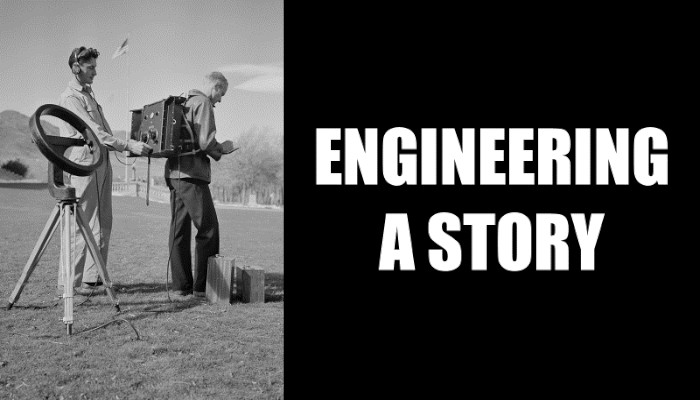
“You know, Ron,” one of my friends said recently, “You breakdown story like an engineer.”
While I’d never really thought about it that way before, she’s right. Story is a massively complicated subject that I’ve approached by using the skills that I learned in engineering school.
![]()
I was a sophomore engineering student at Merrimack College when the professor stopped in the middle of his Digital Signal Processing lecture and dropped a non sequitur. “Why are you here?”
The students just stared at him.
“Why do you want to be an engineer?” Dr. Develis pressed. “Why did you choose a major with such rigor?”
We still had nuthin‘.
He smiled and decided then let us off the hook. “You’re here to learn just one thing.”
We laughed. Surely, he couldn’t be serious. We had to learn mathematics, physics, circuit theory, and control systems. We’d be taking classes in linear algebra, calculus, differential equations, and electromagnetics–not to mention the religion and philosophy courses required to graduate from an Augustinian school.
He dismissed our protests. “Your four years in Engineering school will teach you one thing: a method to solve problems. You’ll learn how to break big problems into small ones. Then, by solving the small problems, you’ll eventually solve the big ones.”
As we pondered that thought, he then made a disturbing prediction. “And you’ll get so good at it, that some people will hate you for it.”
![]()
Although I didn’t believe him at the time, life has proved his grim prophecy to be true. It tends to happen while working on big problems with someone who wants to solve them whole. Unfortunately, all-at-once strategies frequently become a jumbled mess of subjectivity, passion, and emotion–all great things when bringing energy to a problem–but terrible while trying to solve one.
My training forces me to look at problems objectively. First I seek to uncover the root causes to problems. Next I learn as much about them as I can. Finally, I break the big problem into smaller, more manageable ones. The process is ruthlessly sequential and simultaneously infuriating to someone who values action over achievement.
Problem-solving is in my DNA. My work is covered with its fingerprints. For example, The StoryHow™ PitchDeck breaks storytelling into four parts: roles, events, influences, and techniques. The Proverb Effect breaks proverbs down into their base components of function, frame, and finish.
Love me or hate me, I am what I am–a storyteller with a degree in Electrical Engineering.
Photo Credit: United States Office Of War Information, Feininger, Andreas, photographer. Science and research. Mineral prospecting. A ground comparator will reveal the presence of an ore body under the surface of the earth by measuring the total intensity and the plane of polarization of the secondary electro-magnetic field set up by the ore body. These students are using an adjustable coil of copper wire which acts as an electrical transformer, and may be tilted to determine the minimum and maximum intensity of the field. They are conducting an experiment in electronics, taught in the department of geophysics at a famous mining engineering school. They will apply the knowledge they are acquiring to airplane detection and anti-submarine warfare. Colorado School of Mines, Golden, Colorado. Colorado Golden Golden. Jefferson County United States, 1942. Oct. Photograph. https://www.loc.gov/item/2017696228/.